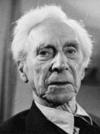- Russell, Bertrand (Arthur William), 3rd Earl Russell
-
born May 18, 1872, Trelleck, Monmouthshire, Eng.died Feb. 2, 1970, near Penrhyndeudraeth, Merioneth, WalesBritish logician and philosopher.He is best known for his work in mathematical logic and for his advocacy on behalf of a variety of social and political causes, especially pacifism and nuclear disarmament. He was born into the British nobility as the grandson of Earl Russell, who was twice prime minister of Britain in the mid-19th century. He studied mathematics and philosophy at Cambridge University, where he came under the influence of the idealist philosopher J.M.E. McTaggart, though he soon rejected idealism in favour of an extreme Platonic realism. In an early paper, "On Denoting" (1905), he solved a notorious puzzle in the philosophy of language by showing how phrases such as "The present king of France," which have no referents, function logically as general statements rather than as proper names. Russell later regarded this discovery, which came to be known as the "theory of descriptions," as one of his most important contributions to philosophy. In The Principles of Mathematics (1903) and the epochal Principia Mathematica (3 vol., 1910–13), which he wrote with Alfred North Whitehead, he sought to demonstrate that the whole of mathematics derives from logic. For his pacifism in World War I he lost his lectureship at Cambridge and was later imprisoned. (He would abandon pacifism in 1939 in the face of Nazi aggression.) Russell's best-developed metaphysical doctrine, logical atomism, strongly influenced the school of logical positivism. His later philosophical works include The Analysis of Mind (1921), The Analysis of Matter (1927), and Human Knowledge: Its Scope and Limits (1948). His A History of Western Philosophy (1945), which he wrote for a popular audience, became a best-seller and was for many years the main source of his income. Among his many works on social and political topics are Roads to Freedom (1918); The Practice and Theory of Bolshevism (1920), a scathing critique of Soviet communism; On Education (1926); and Marriage and Morals (1929). In part because of the controversial views he espoused in the latter work, he was prevented from accepting a teaching position at the City College of New York in 1940. After World War II he became a leader in the worldwide campaign for nuclear disarmament, serving as first president of the international Pugwash Conferences on nuclear weapons and world security and of the Campaign for Nuclear Disarmament. In 1961, at the age of 89, he was imprisoned for a second time for inciting civil disobedience. He received the Nobel Prize for Literature in 1950.
 Bertrand Russell, 1960By courtesy of the British Broadcasting Corporation, London
Bertrand Russell, 1960By courtesy of the British Broadcasting Corporation, London* * *
Universalium. 2010.
